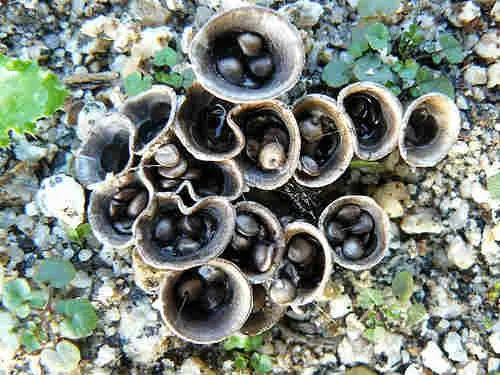Olla’s goblet (Cyathus olla)
- Division: Basidiomycota (Basidiomycetes)
- Subdivision: Agaricomycotina (Agaricomycetes)
- Class: Agaricomycetes (Agaricomycetes)
- Subclass: Agaricomycetidae (Agaricomycetes)
- Order: Agaricales (Agaric or Lamellar)
- Family: Agaricaceae (Champignon)
- Genus: Cyathus (Kiatus)
- Type: Cyathus olla (Olla’s glass)

fruiting body:
in a young fungus, the fruiting body is ovoid or spherical in shape, then as the fungus matures, the fruiting body becomes broadly bell-shaped or cone-shaped. The width of the fruiting body is from 0,5 to 1,3 centimeters, the height is 0,5 – 1,5 cm. The edges of the body are bent. At first, the fruiting body resembles a wide rounded cone or bell with flexible dense walls slightly tapering towards the base. The surface of the fruiting body is velvety covered with fine hairs. In young mushrooms, a membranous membrane of cream or beige-brown color closes the opening. As it matures, the membrane breaks down and falls off.
Peridium:
on the outside, the peridium is smooth, dark brown, lead-gray to almost black. On the inside, the sides may be slightly wavy. Periodioles, which contain maturing spores, are attached to the inner shell of the peridium.
Periodicals:
in diameter up to 0,2 centimeters, angular, whitish when dried, enclosed in a transparent shell. They are attached to the inner surface of the peridium with a mycelial cord.
Spores: smooth, transparent, ellipsoid.
Spread:
Olla’s goblet is found on grassy and woody remains or on soil in steppes, plantations, forests, meadows and pastures. Fruiting from May to October. It grows in close-knit or scattered groups, mainly on rotting wood and the soil near it. Sometimes found in winter. A fairly common species, it can often be found in greenhouses.
Edibility:
In food, this mushroom is not consumed.
Similarity:
bears a resemblance to the Dung Goblet, which is distinguished by a narrow cone-shaped body and a shaggy hairy outer surface of the peridium, black periodioles, larger spores, and a darker inner surface of the fruiting body.









